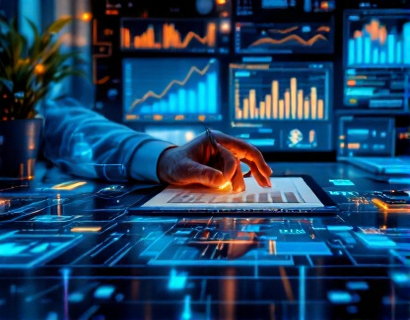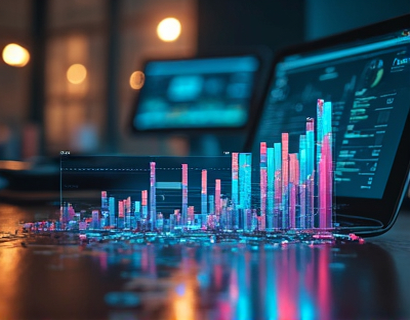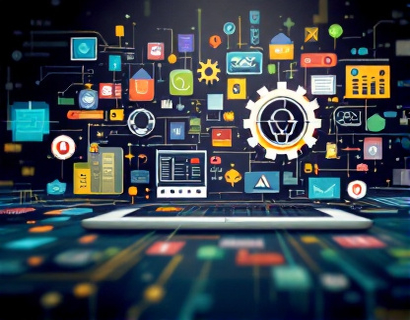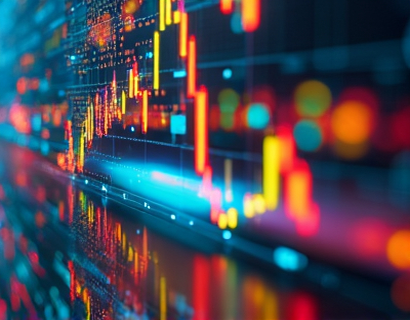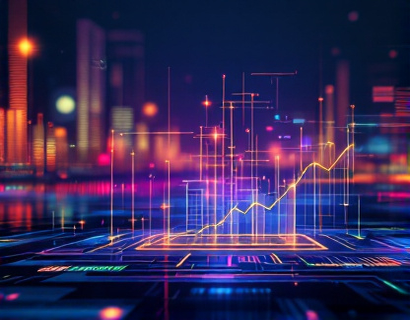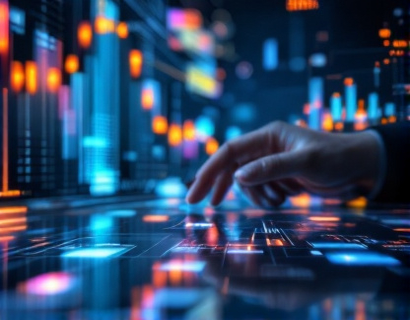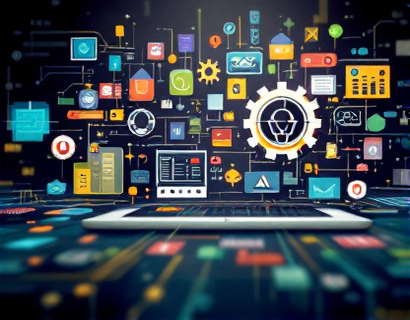AI and Crypto: Transforming Finance and Technology with Innovative Solutions for the Future
The intersection of artificial intelligence (AI) and cryptocurrency is revolutionizing the finance and technology sectors, paving the way for a new era of digital innovation. This fusion is not just a trend but a fundamental shift in how we perceive and interact with financial systems and technological advancements. The integration of AI into the crypto space is creating sophisticated tools and platforms that enhance security, efficiency, and user experience. This article delves into the transformative impact of this merger, exploring how it is redefining the landscape of finance and technology.
The crypto industry, known for its decentralized and transparent nature, has always been at the forefront of adopting new technologies. The introduction of AI has further amplified its potential, offering solutions that were once thought impossible. AI's ability to process vast amounts of data, learn from patterns, and make predictions in real-time is particularly valuable in the crypto domain, where market dynamics are complex and rapidly changing.
Enhancing Security with AI
One of the most significant benefits of integrating AI into cryptocurrency is the enhancement of security measures. Traditional security protocols, while robust, are often static and can be bypassed by sophisticated cyber attacks. AI-driven security solutions, on the other hand, are dynamic and adaptive, capable of detecting and responding to threats in real-time. Machine learning algorithms can analyze transaction patterns and identify anomalies that may indicate fraudulent activity, thereby preventing potential losses.
Blockchain technology, the backbone of cryptocurrencies, inherently provides a high level of security through its decentralized and immutable ledger. However, AI can take this a step further by implementing advanced encryption methods and continuous monitoring systems. For instance, AI can be used to develop more secure smart contracts by identifying vulnerabilities and suggesting improvements. This ensures that transactions are not only transparent but also secure from manipulation and hacking attempts.
Improving Market Predictions and Trading Strategies
The crypto market is notoriously volatile, making accurate predictions and strategic trading crucial for success. AI algorithms excel in this area by analyzing vast datasets to identify trends and patterns that human analysts might miss. Natural Language Processing (NLP) techniques can be used to gauge market sentiment by analyzing news articles, social media posts, and other textual data sources. This sentiment analysis can provide valuable insights into market movements, helping traders make informed decisions.
Moreover, AI can optimize trading strategies through algorithmic trading. These systems can execute trades at optimal times based on predefined criteria, reducing emotional bias and increasing efficiency. Machine learning models can continuously learn from past trades, adapting and improving their strategies over time. This not only enhances the accuracy of predictions but also maximizes potential returns for investors.
Streamlining User Experiences
The user experience in the crypto space can be complex and daunting, especially for newcomers. AI-driven platforms can simplify this by providing intuitive interfaces and personalized services. Chatbots powered by AI can offer 24/7 customer support, answering queries and guiding users through the process of buying, selling, and managing cryptocurrencies. These chatbots can understand natural language, making interactions more seamless and user-friendly.
Personalization is another area where AI shines. By analyzing user behavior and preferences, AI can tailor recommendations and services to individual needs. For example, a crypto wallet app can suggest optimal storage solutions based on the user's transaction history and risk tolerance. This level of customization enhances user satisfaction and fosters long-term engagement with the platform.
Fraud Detection and Compliance
Fraud and regulatory compliance are significant challenges in the crypto industry. AI can play a pivotal role in addressing these issues by implementing robust monitoring and reporting systems. Machine learning algorithms can detect suspicious activities by analyzing transaction patterns and user behavior, flagging potential fraud before it occurs. This proactive approach helps protect both users and platforms from financial losses and reputational damage.
Regulatory compliance is equally important, as governments around the world are increasingly scrutinizing the crypto space. AI can help ensure compliance by automatically tracking and reporting transactions that may violate regulations. This not only simplifies the compliance process but also builds trust with regulatory bodies and users alike. By maintaining transparency and adhering to legal standards, crypto platforms can operate more smoothly and sustainably.
Innovative Financial Products and Services
The combination of AI and crypto is giving rise to innovative financial products and services that were previously unimaginable. Decentralized Finance (DeFi) is one such area where AI is making significant contributions. DeFi platforms leverage blockchain and AI to offer a range of financial services, including lending, borrowing, and yield farming, all without intermediaries. AI algorithms can optimize these services by predicting market conditions, managing risks, and automating processes.
Another innovative product is AI-driven robo-advisors for crypto investments. These digital advisors use machine learning to create and manage customized investment portfolios based on users' financial goals and risk profiles. Unlike traditional robo-advisors, AI-driven versions can adapt to the dynamic nature of the crypto market, making real-time adjustments to portfolio allocations. This ensures that investors are always positioned for optimal returns.
Enhancing Supply Chain and Logistics
The impact of AI and crypto extends beyond finance and into supply chain and logistics. The integration of these technologies can create more transparent, efficient, and secure supply chains. Blockchain provides a tamper-proof record of transactions, while AI can optimize logistics by predicting demand, managing inventory, and streamlining transportation routes. Smart contracts can automate payments and ensure compliance with contractual obligations, reducing delays and disputes.
For instance, a supply chain platform can use AI to analyze data from various sources, such as sensors on trucks and drones, to monitor the condition and location of goods in real-time. This data can be recorded on a blockchain, ensuring transparency and traceability. AI can then optimize delivery routes based on traffic patterns, weather conditions, and other factors, reducing costs and improving delivery times. This level of integration not only enhances operational efficiency but also builds trust among all stakeholders involved.
Challenges and Considerations
While the potential benefits of AI and crypto are substantial, there are also challenges and considerations that need to be addressed. One of the primary concerns is the regulatory landscape. As both AI and crypto are relatively new and rapidly evolving fields, regulations are still catching up. Platforms and services must navigate a complex web of laws and guidelines to operate legally and ethically. Compliance with data protection regulations, such as GDPR, is crucial to maintaining user trust and avoiding legal repercussions.
Another challenge is the technical complexity involved in integrating AI with blockchain and crypto systems. Developing robust and scalable solutions requires expertise in both domains, which can be a barrier for some players in the market. Additionally, the energy consumption associated with AI and blockchain technologies, particularly proof-of-work blockchains, raises environmental concerns. The industry must explore more sustainable alternatives, such as proof-of-stake mechanisms, to mitigate these issues.
Future Prospects
The future of AI and crypto is bright, with numerous opportunities for further innovation and growth. As technology advances, we can expect even more sophisticated AI algorithms and blockchain applications. The convergence of these fields will likely lead to the development of new financial models, such as AI-driven decentralized autonomous organizations (DAOs), which can operate with greater autonomy and efficiency.
Moreover, the integration of AI with other emerging technologies, such as the Internet of Things (IoT) and 5G networks, will create a more interconnected and intelligent ecosystem. This will enable real-time data processing and decision-making across various industries, from finance to healthcare and beyond. The potential for cross-industry collaboration and innovation is immense, promising a future where AI and crypto continue to drive transformative change.
In conclusion, the fusion of AI and cryptocurrency is not just a technological advancement but a fundamental shift in how we approach finance and technology. By enhancing security, improving market predictions, streamlining user experiences, and creating innovative financial products, this merger is setting new industry standards. As the landscape continues to evolve, it is essential for stakeholders to stay informed and adapt to the changing dynamics, embracing the opportunities that AI and crypto have to offer.








